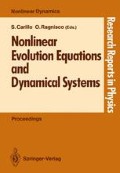Abstract
The Hirota’s bilinear method [1] is now an important part of soliton theory (for reviews see e.g. [2,3,4]). The idea behind it is to use some transformation to put the nonlinear evolution equation (NEE) in a form which is quadratic in the dependent variable(s) and where derivatives appear only through the bilinear operator defined below. In this form the construction of soliton solutions is much easier.
Supported by the Academy of Finland
Access this chapter
Tax calculation will be finalised at checkout
Purchases are for personal use only
Preview
Unable to display preview. Download preview PDF.
References
R. Hirota, Phys. Rev. Lett. 27, 1192 (1971).
R. Hirota, in: Biicklund Transformations, the Inverse Scattering Method, and Their Applications, ed R.M. Miura, p. 40, Springer, Berlin, (1976).
R. Firota, in: Solitons, eds R.K. Bullough and P.J. Caudrey, p. 157, Springer, Berlin (1980).
J. Hietarinta, in: Partially Integrable Nonlinear Evolution Equations and their Physical Applications, ed R. Conte, to appear.
In the Hirota form the soliton solutions are expressed in terms of finite sums of exponentials and the solution is therefore as regular as one can hope. This suggests the idea that the Hirota substitution for a NEE could be found by looking for a transformation that eliminates all singularities, see M. Kruskal and J. Hietarinta, work in progress.
J. Hietarinta and R. Hirota, submitted to Phys. Lett.
J. Hietarinta, J. Math. Phys. 28, 1732 (1987).
J. Hietarinta, J. Math. Phys. 28, 2094 (1987).
J. Hietarinta, J. Math. Phys. 28, 2586 (1987).
J. Hietarinta, J. Math. Phys. 29, 628 (1988).
J. Hietarinta, work in progress (1989).
A.C. Hearn, REDUCE User’s Manual Version 3.2, Publ. CP78, Rev 4/85. Rand, Santa Monica (1985).
J. Hietarinta: Integrability and Spectral Methods, eds. A. Degasperis and A.P. Fordy, Manchester University Press (1989).
B. Grammaticos, A. Ramani and J. Hietarinta, submitted to J. Math. Phys.
Author information
Authors and Affiliations
Editor information
Editors and Affiliations
Rights and permissions
Copyright information
© 1990 Springer-Verlag Berlin, Heidelberg
About this paper
Cite this paper
Hietarinta, J. (1990). Equations That Pass Hirota’s Three-Soliton Condition and Other Tests of Integrability. In: Carillo, S., Ragnisco, O. (eds) Nonlinear Evolution Equations and Dynamical Systems. Research Reports in Physics. Springer, Berlin, Heidelberg. https://doi.org/10.1007/978-3-642-84039-5_8
Download citation
DOI: https://doi.org/10.1007/978-3-642-84039-5_8
Publisher Name: Springer, Berlin, Heidelberg
Print ISBN: 978-3-540-51983-6
Online ISBN: 978-3-642-84039-5
eBook Packages: Springer Book Archive

